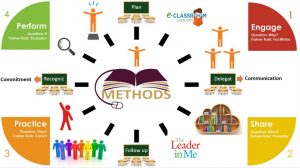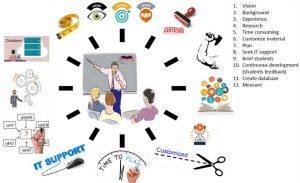METHODS is a European Union-sponsored Erasmus Plus project that aims to improve the quality of teaching and learning at universities of partner countries by incorporating technological tools that are consistent with pedagogical best practices and build the capacity of universities to evaluate, develop, and design e-curricula, making them available on an open portal. To achieve this objective, the project has established a national center in both Jordan (at Jordan University) and Palestine (at Birzeit University) to serve as a hub for utilizing best practices in information and communications technology (ICT) in higher education in both countries. These centers facilitate the establishment of diverse clusters that draw from a pool of staff members from all academic disciplines. Education specialists will review the proposed learning material to ensure compatibility with the relevant standards, and multimedia designers will design the interfaces, activities, presentation, layout, and animation included in the e-curricula.
Information technology innovation and entrepreneurship are necessary components of the national, regional, and international educational strategy of universities, but it is difficult for individual universities to shoulder the sole responsibility. Accordingly, a comprehensive approach has been adopted that includes coordination and partnerships among various stakeholders and national authorities. The project’s main goal is to raise the competencies of individual learners, enabling them to become active members of the knowledge society by enhancing the learning process of students and allowing them to acquire twenty-first-century competencies as autonomous and active learners. In addition, it will improve the quality of teaching at local universities.
METHODS strives to transfer knowledge and apply best practices within collective intelligence. Member institutions include universities from Jordan, Palestine, the United Kingdom, Spain, Bulgaria, and Denmark.
METHODS strengthens entrepreneurship education across the region by using blended learning, flipped classrooms, e-learning pedagogies (E-class), online learning, and massive open online courses (MOOCS). It will shift from teacher-centered to student centered approaches, employ competency-based, problem-based, product-based, and project-based learning, integrate entrepreneurship into curricula, and foster cooperation between universities and policy makers in order to establish a common agenda for change. The program will assist universities in formulating adequate policies and procedures and in adopting frameworks and best practices to encourage ICT innovation and develop students’ entrepreneurship mindsets. Furthermore, it will facilitate a dialogue between universities in order to create a clear vision and agreed-upon national standardization as part of globalization and internationalization efforts.
Globalization poses new challenges to Palestinian universities, and these challenges are augmented by the special Palestinian condition. Living under occupation reduces the possibility of advancing education, especially as international experts and scholars are increasingly subject to travel restrictions and are denied access to the State of Palestine – affecting the socio-economic and education sectors in Palestine and therefore employment rates, particularly among youth.
In a setting where the unemployment rate is one of the highest in the world, the role of universities in fostering the use of ICT innovation and entrepreneurship becomes imperative. Applying technology in Palestinian classrooms qualifies students to become global academic citizens. They gain a broader understanding of policies, systems, and best practices in their domain of specialty, which increases opportunities for professionalism and career development while also serving the institutions, as it facilitates accreditation of courses they present internationally. Consequently, Palestinian universities may receive higher quality academics, an advantage that, in turn, will contribute positively to the Palestinian economy.
Palestinian universities are able to generate and apply knowledge to development challenges and thus play a central role in creating employment and generating income through methods such as the smart use of technology, the teaching of entrepreneurship, and the fostering of soft-skills development. Equipping and qualifying our undergraduate, graduate, and postgraduate students for smoother enrollment in the labor market, both locally and internationally, will lead to increased economic growth. We must embrace this great opportunity to start sharing knowledge and bridging experience, and include training courses, workshops, and exchange opportunities for our students in order to overcome the obstacles that the occupation puts up to hinder the process of bridging academic development with labor market needs and demands in Palestine.




